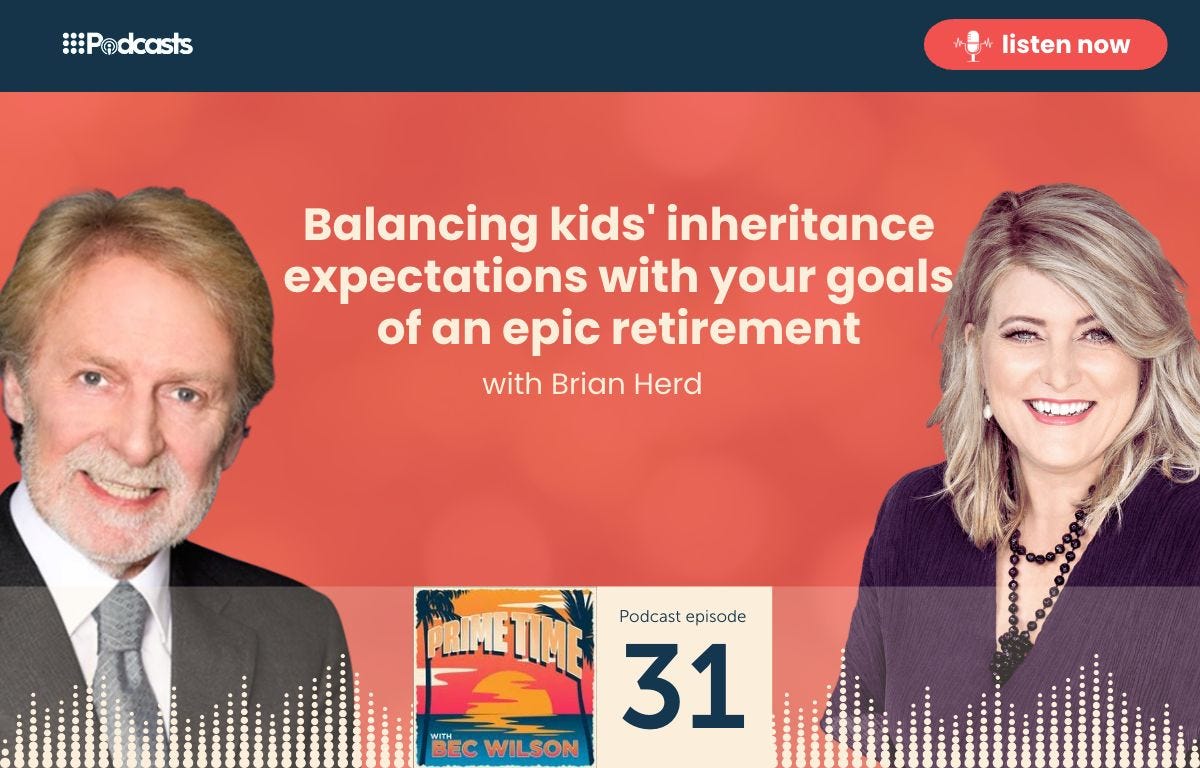Finding financial advice in your fifties
And, how to retire happy and still leave your kids an inheritance
In this edition
Letter: Finding financial advice in your fifties
In today’s Newspapers: How to retire happy and still leave your kids an inheritance
From Bec’s Desk: Still holding firm at #89
Prime Time podcast: Balancing kids' inheritance expectations with your goals of an epic retirement with Brian Herd
Finding financial advice in your fifties
Dear Bec,
I've just found you through the Age and wanted some advice. I expect you may have been asked this before, but I wasn't sure where to look. I am a 49-year-old female with a 50-year-old husband and two kids (15 and 17). We are looking at setting up our finances for an early retirement between ages 55 and 60 if possible. We need to find someone to help us make a plan, but I have trouble knowing who to trust.
Can you offer some advice on how to find a financial adviser that specialises in retirement? I am worried that if I look to my super fund for help, they will have a bias towards their options and not be impartial.
Many thanks, Natty
Hi Natty,
Thank you for reaching out. It’s amazing how many letters I get about this. I wish there were an easy solution, but vested interests are everywhere, both among funds and advisers. Your best protection is to start yourself off with a good basic education in financial and retirement literacy and then take a step-by-step approach, validating each step along the way. If you’re looking to retire in your fifties, you’ll be expecting to self-fund a significant portion of your retirement before age pension age even arises. So financial literacy and a good base of investments is going to be crucial. Consider seeking advice from both superfund advisers and independent advisers, really learning from the process and becoming your own best judge. You’ll be looking for an advice relationship that helps you really achieve your (rather ambitious) goals.
I honestly do believe advice is critical. It’s important to know what type of advice is right for you and to think about your end goals before seeing an independent adviser. Different situations and needs require different types of advisers, who can have very different approaches to ongoing and upfront fees. I like people to consider working through it rather than rushing it. Consider my two-step approach.
Step 1: Consider using your super fund’s advice to educate yourself, evaluate what they say, then assess if you need more.
Funds usually offer intrafund advice ‘at no extra cost,’ which really means it’s included in your member fees. It’s worth using this to learn more about your superannuation and become savvy and street smart. Then use that knowledge to determine whether/when you need to see an independent adviser and what specific help you need to pay more for. Think of it as a a stepping stone in your education. In addition, you’ll get a better look at what your fund really does offer and whether you want to push to keep them in the mix in your future.
Your super fund can give you advice on your risk appetite, superannuation investments, how super aligns with the age pension at retirement, and they can review your insurances inside super. However, if you and your partner need comprehensive advice on the bigger picture or insurance outside super, and how to fund your retirement before you can access super, you’ll need to find an independent adviser.
Step 2: Understand the right type of independent advice for you.
Before you walk in, consider whether you want to be ‘switched out’ of your superannuation fund into a managed portfolio of investments, or if you want to maintain your super fund, and build investments outside super; or you just want a strategic plan that revs up your approach to saving and puts your superannuation into the right risk level for maximising compound returns. Anyone planning to retire before 60 needs to think about where they’ll invest for the years before they can access their super and how they want to structure those investments - if they plan to live off passive income before the age of 60.
While I don’t actively recommend specific advisers, as everyone’s needs are unique, I suggest a very specific approach to finding one. Start by looking within your local community to find one that is reputable. Identify the most successful people you know who share your values and ethos, and ask them who their adviser is. Seek recommendations from two or three people you respect and know personally in your area.
In my opinion, this is the best way to find someone who has ethically built their business providing financial advice up with a good reputation over time. Resist the temptation to seek advisers in Facebook groups or take advice from people who haven't invested the time and effort to establish their credibility in their community. (you’ll note everyone on the internet has ‘a mate’ that does this that they’d love to introduce you to - be very wary! Plenty of people pay ‘mates’ online for leads).
You should meet with at least two to three advisers in person when considering your options. Most, if not all, will offer a free initial appointment. Keep in mind that they won’t be able to provide you with proper advice on your situation until AFTER you’ve completed a fact find and they’ve prepared a statement of advice. This is usually when you’ll receive a quote for their services, outlining both the upfront and ongoing costs. Nothing will be done until you pay them for their upfront services. All the good learnings and advice come after that. But you have to make a choice BEFORE you pay.
One interesting thing to point out is that most, if not all advisers are tied to a dealer group, the company that provides their investment services, defines their preferred product list, and sets the standards and procedures they follow. This affiliation can influence the products and services the adviser recommends to you and the way they do business. Be aware of who this dealer group is and how that relationship works and what the limitations of their preferred product list are; and contrast that with your investment and advice objectives. Advisers, their approach, and their skills can vary greatly so some of these things help to guide you!
Here’s a much longer article I wrote about financial advice, and I even got some adviser friends to read it to see if they agreed - they did! What to expect when you go looking for a Financial Adviser. And of course, there’s a section in my book too.
Cheers, and let me know how you go! It’s a great question to ask!
Bec
Got a letter? Send it to me at bec@epicretirement.com.au.
How to retire happy and still leave your kids an inheritance
This article was first pubished in The Age and The Sydney Morning Herald, the Brisbane Times and WA Today, in both print and digital.
Retirement should be the time when you finally get to live out your dreams, free from the grind of work and the daily challenges of child-rearing. But for many retirees, who have saved for their retirements for 40 or more years, there’s another set of obligations in the way.
Many modern retirees are feeling a tremendous amount of pressure to pass money on to their children and grandchildren, either before or after they die. There’s a careful balance to be struck between spending on the retirement of your dreams, the fear of running out of money before you die, and the fear of falling out with your children and grandchildren over money.
As the first generation to have saved for their much longer retirements, and to have benefited enormously from the invention of superannuation and a generation-long housing boom, Boomer retirees are in a better position than their parents ever were. And their kids know it.
If you believe the mainstream media, there’s a whole generation of Millennials looking at their parents’ wealth and wishing they would die sooner rather than later, or just give them some money to soften the blows of this very tough economy.
It could be a product of the helicopter parenting era where Boomer parents have provided so well for their Millennial children that they have an almost understandable sense of entitlement that the gravy train will keep delivering.
The reality no one is pointing out is that our growing life expectancies mean most Millennials won’t receive any inheritance from the death of their parents until they are well into their late 50 or in their 60s, which is really too late to help them onto the housing ladder. So it leaves the decisions in the hands of today’s retirees.
People looking into retirement are faced with a conundrum. Do they use their hard-earned and saved money to live out the retirements of their dreams, throwing caution to the wind and expecting to spend their latter years of life dependent on the age pension and their darling children who they didn’t offer generosity to?
Do they sacrifice some of those savings, trade down some of their wilder dreams and help their kids and grandkids financially? And if it’s the latter, do they help them financially today, while they (the retirees) are alive, or do they make them wait until they die?
This week on the Prime Time podcast, I chatted with HopgoodGanim Lawyers estates and succession partner Brian Herd about how the current generation of retirees should navigate these issues. Our conversation pointed to seven big and meaningful lessons.
Find the right balance
Finding the appropriate balance between living your retirement dreams and providing some assistance to your children is difficult. This is the first reconciliation most people have to do, and in essence, it is deciding your financial philosophy.
The real legacy of your life is the relationships you leave behind and the love for one another that you have.
I suggest that people consider their own goals and happiness first, contemplating what they really want their second half of life to look like, and how much money they’ll need to achieve it, before understanding what that leaves for their children.
Not everyone has the money to choose this, but those who do should be careful with their prioritisation. You might have a long life ahead.
Throw tradition to the wind
If you don’t have a lot of money and you want to live your retirement well, consider that maybe it’s time to throw some of those money-sucking traditions to the wind.
It used to be that a parent was expected to pay for the wedding, which can extend well into six figures today, a sizable portion of average retirees’ retirement budget. But we must remember that we don’t have to live life by tradition any more. No other generation does.
Acknowledge FOMO and FOFO
Many parents will find themselves juggling a fear of missing out (FOMO) on their own retirement dreams and yet, alongside that, they have an immense fear of falling out (FOFO) with their children if they don’t provide financial support when it’s demanded (and demands are increasing, rather than requests, Herd says).
You’ll feel the swings of judgment and worry, but if you’re making an active choice, and you really believe in the reasons why, then it will be a lot easier to communicate.
Communicate with your family
Previous generations got old after midlife, so we’re unaccustomed to talking about ‘goals’ for our second half. That’s something we have to get past. The only way that goals, dreams and expectations can be managed within families is through good communication.
All generations deserve to have some goals and some expectations. You might consider writing out your philosophy and retirement goals first, so you and they can be clear before discussing them with your children openly about your goals and intended actions.
My ultimate hope for you is that open discussion will set up realistic expectations and remove some of the risks of FOFO in your life.
Remember the importance of fairness
As you look at how you dole out money to your children in life or death, remember how important it can be to offer all children fairness. The best way to do this is with transparency.
This article continues on The Age and The Sydney Morning Herald here.
Still holding firm at #89
A nice warm mid winter week up in Queensland this week. Plenty of sunshine, outdoors and fresh air in between writing, teaching the Epic Retirement Flagship Course and preparing for the speeches and programs ahead.
The How to have an Epic Retirement Flagship Course has now had week four kickoff, again, very smoothly. Our live event last week for week three was with the State Manager for Queensland and Senior Financial Adviser at Ord Minnett, David Lane who answered droves of questions about SMSF investing, superannuation and financial advice. Coming up this week we have the wonderful Jon Standen from HESTA to teach us about superfunds financial advice and answer the myriad of questions on super.
Our next program kicks off on the 8th August. You can find out more and book your place here. The 25% off earlybird pricing is on now.
Here’s a bit of incidental feedback written on the wall of the course community chat this week… both of which made me smile. Thanks ladies!
“Am truly enjoying this course and recommending it to many friends and colleagues … best money spent this year!!” Claire
(in reply) “I agree. I currently have my daughter visiting from interstate. She has been nearby when I have been listening to this weeks modules and at the end there has been a lot of discussion and interest shown in the information presented coupled with quite a few "I didnt know that" comments. I have gained knowledge that I can now discuss and pass onto my children so that they can educate themselves further with courses such as this and then pass/instill those evolving lessons onto their children as they grow,” Karen.
I wrote another midweek feature for The Age, The Sydney Morning Herald, The Brisbane Times and WA Today this week. A really long and useful one. “How do you actually spend your super. Here’s all you need to know”. Find a comfortable spot and a cuppa and have a read. It’s one of those long, educational ones.
And this week’s podcast really hit the spot. I got so many emails and messages from people about it! It’s a straight-to-the-point chat with succession and estates lawyer, Partner of Hopgood Ganim, Brian Herd, about ‘balancing kids' inheritance expectations with your goals of an epic retirement’. More on this one below.
11 months went by this week since the release of How to Have an Epic Retirement and it’s still holding firm at #89 on Amazon Australia’s bestseller list! Hundreds and hundreds of books are still selling each week all over the country which is a blessing! You can buy one here on Amazon - a new batch has just arrived in warehouses. If I could ask you a favour. If you have bought it on Amazon - please leave a review. It helps for people to hear real, honest insights from people like them! And, tell your friends.
Got a letter? Email me on bec@epicretirement.com.au. And don’t forget to join the conversation in The Epic Retirement Club facebook group. It’s constantly pumping!
And that’s enough for this weekend. Have a lovely Sunday. Until next week - make it epic.
Many thanks! Bec Wilson
Author, podcaster, guest speaker, retirement educator … Visit my website for more info about me, here.
In this norm-challenging episode of the Prime Time podcast, we tackle the delicate balance between living out your goals for an epic retirement and managing your children's expectations of inheritance. This is a hot topic in the media, as many pre-retirees and retirees today face the challenge of living well while having to navigate sometimes hefty expectations of being a (significant) contributer to the financial futures of their adult children and their grandchildren.
To talk about it I’m joined by Brian Herd, Partner of the Estates and Succession team at HopgoodGanim Lawyers and author of the book, The Ageing Parent Trap. Brian’s helped thousands of families set their family plans, wills and living wills in his time. He’s also spent many years untangling family disputes over money and inheritances and managing expectations within families. So he’s got lots of valuable lessons for all of us.
LISTEN TO THIS EPISODE OF THE PODCAST HERE:












